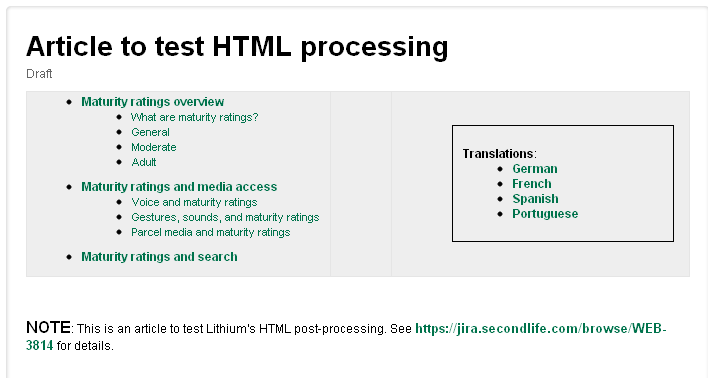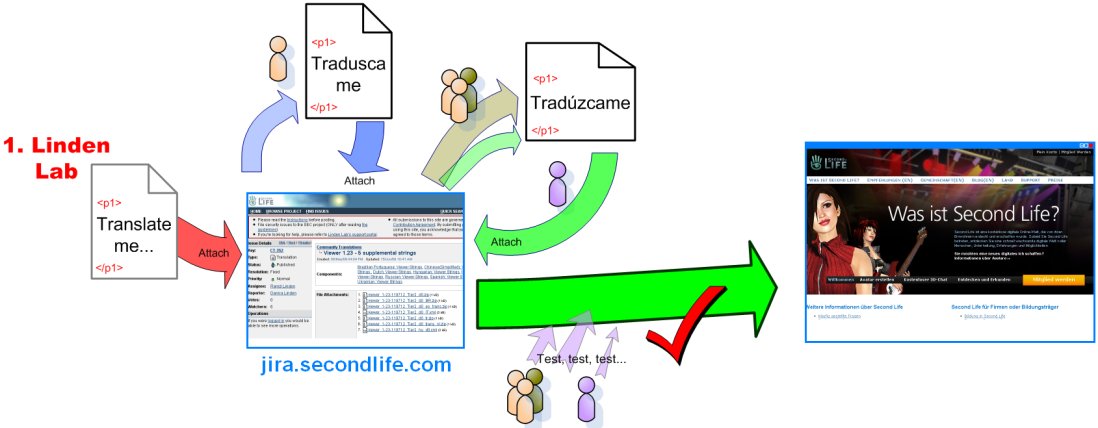Difference between revisions of "Community Translation - Tools we Use"
Rand Linden (talk | contribs) |
m |
||
| Line 1: | Line 1: | ||
{{OldVol}} | |||
[[Category:Localization]] | [[Category:Localization]] | ||
<< Back to [[Community Translation Project]] | << Back to [[Community Translation Project]] | ||
Revision as of 04:11, 21 September 2011
The volunteer information on this page is now out of date and will be kept for historical purposes. Please do not update information on this page.
<< Back to Community Translation Project
Public Issue Tracker (PJIRA)
The Issue Tracker is found here: http://jira.secondlife.com/browse/CT
- Learn about the JIRA workflow on the page Community_Translations_-_JIRA_Workflow
- This is the hosted portal where new files are posted for translation. We set up a special section of this Issue Tracker called "CT".
- Every new English document has its own number, such as CT-103, CT-104, CT-224, etc.
- You can download these documents, and then translate them on your own computer.
- When you have finished a translation, you will post your document back to the CT issue, as a new Attachment.
- Others might download your attachment to review and revise your work -- this is the way we work collaboratively.
A "Style Guide"
A Style Guide gives some preliminary concepts and rules to follow for a language, based on agreement with Linden Lab of what language style and tone will work best for Second Life in that language.
If you are working in one of these languages, read this first to become familiar with the suggestions:
Adding links to translations to Lithium KB articles
Use the following HTML to add links to translations to an article:
<html4strict>
<tbody> </tbody>|
... |
In other languages:
|
</html4strict>
This puts a small box to the right of the TOC. For example:

For short articles that don't have a TOC, you can just use the <div> tag.
NOTE: Put this into English articles as well as translated articles. Notice that the words for the languages are those of the language itself, e.g. "German" is "Deutsch". These are used in ALL languages.
Also the text "In other languages" should remain in English everywhere. We might consider localizing that text into the target language, but that would require a bit of extra care.
A "Glossary" of official, standard translations
- The official Glossary of terms can be found here:
- Second Life Glossary (new) - View only
- Or click here for Edit access - Community editors only
- If you cannot access this document, please contact: Lexie Linden
A text editor program
- Residents use any of various text editors, but your editor must be able to handle UTF-8 encoding. (Please do not use MS Word.)
- A program such as Notepad2 is free and is ideal for this.
- A program called Komodo Edit is free and open source.
- Those using a MacOS may want to use the Textedit program.
In-world Group
- Residents and Lindens often exchange information and announcements through the SL Group called "Second Life CT Projects". You will be added to this group once you join the CT Project!
Email list
- Residents and Lindens sometimes exchange annoucements or instructions on an email list, ctproject@lists.secondlife.com . You can sign up for this list (you will receive a confirmation email) and will be allowed to email this list once you join the CT Project!
Community Translator Forum
- Translators have access to a private discussion forum. You will have this access after sign up and acceptance to the group. If you find that you still cannot access the forums after that, please log into the Second Life Blog and then contact Lexie Linden.
- For holding the official Glossary terms of each language, we store these in a hosted, shared spreadsheet. You will have access to this spreadsheet once you join the CT Project!
- Also, sometimes bugs are recorded by many volunteers into a shared Spreadsheet. You will have access to this spreadsheet once you join the CT Project.
